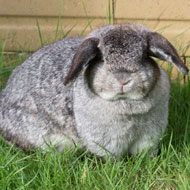'More research needed on rabbit obesity'

Benato cited a 2006 study that found 23 per cent of rabbits were overweight or obese.
The prevalence of rabbit obesity in the UK could be underestimated and requires further research, said Livia Benato as she advised vets on diagnosis, treatment and prevention at BSAVA Congress.
Highlighting the difficulty in determining the scale of the problem, Benato cited a 2006 study that found 23 per cent of rabbits were overweight or obese, and a later study in 2012 that estimated 7.6 per cent of rabbits were overweight. Meanwhile, the Pet Food Manufacturers' Association (PFMA) puts the figure at around 28 to 30 per cent.
Whilst rabbits are the UK's third most popular pet after dogs and cats, the prevalence of obesity in this species is less well known.
Benato cited the risk factors for obesity as: poor diet, lack of exercise and activity, lack of companionship, lower metabolism, gender, neutering status, geographical location and provision of fruits/treats.
Interestingly, rabbits with a companion were found to be less likely to be overweight, which is thought to be down to lower stress levels. However, it is thought only 41.6 per cent of rabbits in the UK are kept with another rabbit.
Hutch size is also a key factor, as rabbits will move very little if they are kept in small hutches where they cannot hop freely.
Tools for diagnosing rabbit obesity are relatively limited, although Benato pointed towards the PFMA's rabbit size-o-metre, which - although subjective and not fully validated - is perhaps something all vets can make use of.
Benato advised looking at the head:body size ratio and observing whether the rump is bulging out, the stomach is touching the ground, and if there are skin folds or a double chin. As well as looking at the rabbit, it's important to palpate the spine, rump and ribs. In diagnosing obesity, vets should look at the body condition score and clinical signs in unison, she added.
Problems likely to be seen in overweight rabbits are reduced flexibility, digestive upset, inability to groom, urine scalding, pododermatitis, moist dermatitis, increased risk of mites, faeces stuck to the perineal area and subsequent inflammation and infection. Overweight rabbits are at greater risk of arthritis, hepatic lipidosis and pregnancy toxaemia, as well as complications under general anaesthetic and during surgery.
In order to treat obese rabbits, owners should be given an achievable plan taking into account the individual animal's energy requirements, dietary calorific content and ideal weight. Benato stressed that weight loss should be gradual - aiming to lose 0.5 per cent to one per cent of their body weight per week through reduction of pellet feed and treats/fruits. Research suggests the ideal diet for rabbits to be made up of largely hay/grass fed ad lib, green vegetables and a small amount of pelleted feed.
Exercise should also be increased gradually through providing more space to move, dig, chew branches and run through tunnels. Enrichment can be provided through toys.
In order to prevent and deal with rabbit obesity, Benato said it is our duty as a profession to inform owners of rabbits' dietary requirements, the severity of obesity issues and how to manage them correctly. Weight clinics are one method through which practices can prevent and treat obesity, helping to build crucial trust between vets and rabbit owners.



 The latest
The latest